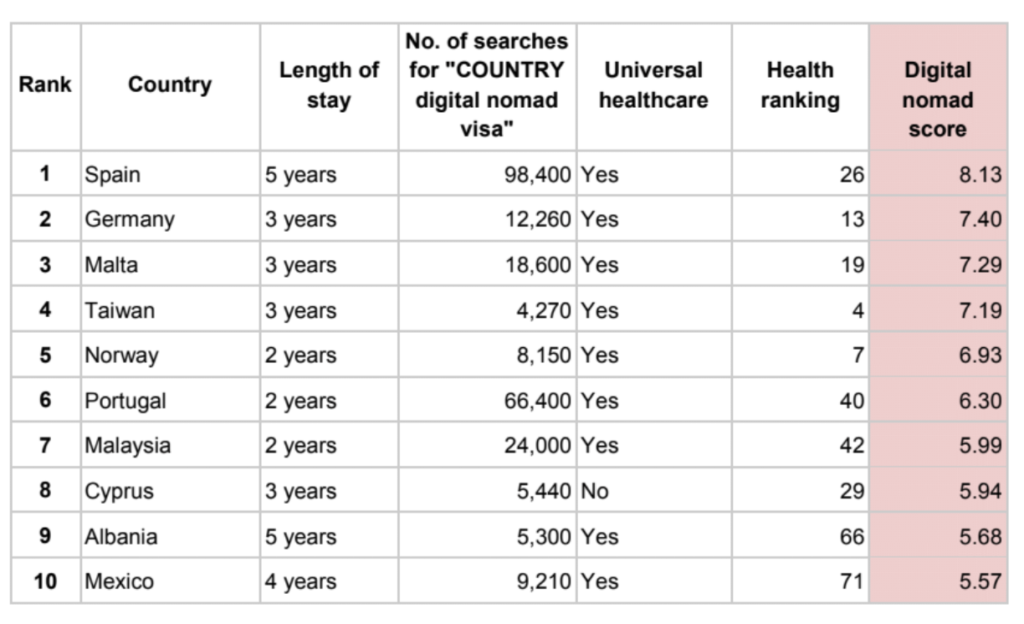The global working landscape has undergone a massive shift during the yearsfollowing the pandemic due to the rise of work-from-anywhere policies. Now, severalcountries offer tailored visas specifically aimed at travellers who want to live in a differentcountry while still working for their employer back home.In this campaign, we will look at which countries are leading the boom in digital nomad visas,comparing what each visa offers travellers and using search volume data to determine themost popular.We will also compare how healthcare varies for each of these countries, including whetherthey have free healthcare and whether sexual healthcare is free or not.In addition, we will look at where each country ranks for overall health on the LegatumProsperity Index.
Following the COVID-19 pandemic, the global working landscape has undergone a hugeshift. Many companies have introduced work-from-anywhere policies which provide benefitsto both the company itself and its employees.This has led to multiple countries now offering visas that are specifically tailored to digitalnomads. These visas allow travellers to live in a different country while still working for theiremployer back home.But which countries are the best for digital nomads to relocate to?To find out, we’ve analysed various factors for each country that currently offers a digitalnomad visa. This includes the length of stay available, potential interest in the visa onGoogle, whether the country offers universal healthcare and where they rank globally interms of health.If you’re considering becoming a digital nomad, it’s important to take outinternational healthinsuranceso that you’re covered for any potential medical expenses.
The best countries for digital nomads to relocate to

1.Spain-8.13/10 digital nomad scoreSpain tops the list with a digital nomad score of 8.13/10. Over the past year, there were over98,400 Google searches for “Spain digital nomad visa”. The country introduced its digitalnomad visa in December 2022, allowing remote employees to work from cities such asMadrid and Barcelona or islands such as Ibiza and Lanzarote. Those looking to relocate toSpain can stay in the country for up to five years but must be earning between €2,000 and€3,000 (£1,704 and £2,556 or $2,166 and $3,249) per month.Spain ranks 26th in terms of health around the world. The country offers a universalhealthcare system to its residents called Sistema Nacional de Salud (SNS). The system isfunded by social security contributions from working residents and allows an employee’sspouse or dependent children to also receive coverage. Residents are only required to pay aproportion of any prescription charges, but additional specialised medical care may lead toadditional costs. For this reason, international health insurance isstill considered essentialfor digital nomads.
2.Germany-7.40/10 digital nomad scoreIn second place is Germany, earning a digital nomad score of 7.40/10. There were over12,200 Google searches for “Germany digital nomad visa” within the last year. The countryis a great place to relocate to for those working in industries such as technology, engineeringand innovation. Digital nomads can initially work in the country for three months but thevalidity of the visa can be extended for up to three years. No minimum income is required ofapplicants, however, proof of stable income must be provided.
3.Malta-7.29/10 digital nomad scoreNext is Malta, with a digital nomad score of 7.29/10. Over the past year, over 18,600 Googlesearches were made for “Malta digital nomad visa”. The country allows both freelancers andcontracted workers to relocate there and is a hub for industries such as gaming andgambling. Digital nomads can work in the country for a minimum of 12 months, but this canbe extended to a maximum of three years. Employees must earn a minimum of €2,700 or$3,000, which is equal to between £2,300 and £2,500.Malta ranks 19th across the world in terms of health. The country has one of the mostadvanced healthcare systems available, including both public and private care. Malta’sprimary hospital, the Mater Dei Hospital, has one of the largest medical buildings in Europe.Although the country has such a well-established healthcare system, the Maltese Ministry ofHealth still considers it essential for foreign residents to have international health insurance.
4.Taiwan-7.19/10 digital nomad scoreTaiwan follows closely behind, earning a digital nomad score of 7.19/10. There were almost4,300 Google searches for “Taiwan digital nomad visa” within the last year. While notspecifically a digital nomad visa, Taiwan’s Employment Gold Card combines a work permit,residency permit, an alien resident ID and a re-entry permit. The visa, which allows people tomove to Taiwan without having first secured a job, is valid for between one to three years.Only freelancers are required to provide proof of stable income, standing at $5,700 (£4,483or €5,253).In terms of health across the world, Taiwan ranks fourth, which is the highest position of allcountries that offer a digital nomad visa. The country has one of the best healthcare systemsin the world and it is mainly financed through premiums which are based on payroll tax.
5.Norway-6.93/10 digital nomad scoreIn fifth place is Norway, with a digital nomad score of 6.93/10. Over the past year, over 8,150Google searches were made for “Norway digital nomad visa”. The country initially only had ascheme in place for those who wanted to live on the remote island of Svalbard, but it hasnow been extended to include the rest of the country. Digital nomads wanting to relocate toNorway should apply for a normal residency visa, which is valid for two years, and declarethemselves as employed fora foreign company or self-employed. No proof of income isrequired when moving to Norway.
Spain and Albania offer the longest visa stays.
Spain and Albania-5 years validity
The countries offering the longest visa stays for digital nomads are Spain and Albania. Asmentioned previously, Spain offers a five-year stay for all digital nomads. However, there aresome criteria that applicants need to meet, such as having been working remotely for atleast one year and having been employed by their current company for at least threemonths. To register for the visa, digital nomads will be required to pay a €75 (£64 or $81)registration fee, as well as €15 (£13 or $16) for a residency card.Despite Albania only recently updating its short-term visa policy to include digital nomads,the country has worked hard to streamline its application process. With the visa beingrelatively new, the exact minimum income requirement isn’t entirely clear but is thought to bearound $9,800 (£7,694 or €9,026). Initially, digital nomads can relocate to Albania for oneyear, but this can be extended to two or five years.

0 comments